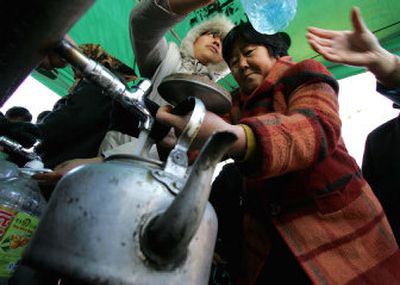Tainted water hits political nerve

HARBIN, China – It was dusk on Friday when the trucks finally made it to Chengxiang Road, first a big orange tanker carrying clean water for the local heating plant, then a smaller blue one with more for household use. As word spread through the grimy apartment buildings, residents in heavy coats poured onto the street with plastic buckets, porcelain basins and steel pots.
Zhang Hongdi, 42, a farmer hired to bring water into this Chinese city from a well in the rural suburbs, sat atop the blue tanker, urging the crowd to form a line and be patient. “There’s enough for everyone!” he shouted, as residents peppered him with questions: Where is the water from? How much can we take? When will you come back?
After another day without running water, the third this week in Harbin following an emergency shutoff caused by a massive chemical spill into the region’s main river, many in the line expressed relief that help had arrived in their neighborhood. But standing in the cold, waiting their turn in front of a hose connected to the tanker, people also shared their anger.
“All of these problems are caused by the government,” one man growled as he struggled to carry a huge red bucket of water back to his apartment. He began to say more, but his wife cut him off as a local official walked over, loudly praising the ruling Communist Party.
Twelve days after an estimated 100 tons of benzene and other toxic compounds poured in the Songhua River following an explosion at a state-owned petrochemical plant, the party is struggling to contain a political crisis as much as an environmental one.
Daring journalists succeeded in publishing a series of reports on Friday describing in remarkable detail the efforts by party officials to cover up the chemical spill. Among the disclosures was an admission by a provincial governor that officials in Harbin initially lied to the public about why they were shutting down the water supply, because they were awaiting instructions from senior party leaders.
On Friday night, reporters who had traveled to Harbin from across the country received orders from the party’s central propaganda department to stop asking questions and return home. All state media were told to use the reports only of the official New China News Agency, the journalists said.
Meanwhile, the central government used the news service to announce it was sending a team of high-level investigators to Harbin. In a sign the party is worried about a public backlash, the report suggested in unusually blunt terms that officials would be disciplined. “Punishments of irresponsible acts are on the way,” it said.
The party’s moves to limit the political fallout came as a 50-mile-long slick of toxic river water continued to flow through Harbin, a city of 3.8 million people in Heilongjiang province about 600 miles northeast of Beijing. The city said concentrations of benzene had fallen to safe levels, but amounts of a related toxic compound, nitrobenzene, remained more than nine times above acceptable limits as of Friday evening.
The spill occurred after an explosion Nov. 13 at the Jilin Petrochemical Co. that killed five workers and injured 70 more. The plant, a subsidiary of one of China’s largest energy firms, China National Petroleum Corp., is located about 165 miles upstream from Harbin in neighboring Jilin province.
Party officials at the factory and in the Jilin government at first denied the blast caused any pollution. But in one of several tough reports on Friday, the state-run China Youth Daily quoted an unidentified city engineer in Jilin saying party officials there were told of the chemical spill within eight hours of the explosion.